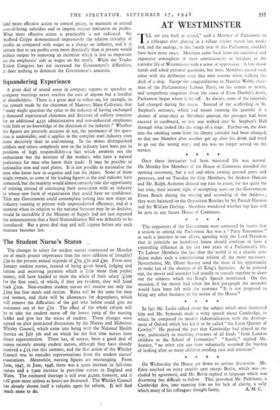Wages and Profits
Viewed in retrospect the Trades Union Congress at Margate must be regarded as reasonably satisfactory from the point of view of the community as a whole, which is the point of view that primarily matters. The danger that wage demands would be advanced, or supported, which the Government could not possibly concede, was very real. What was at stake was the principle of last year's White Paper, that both wage increases and profit increases—or dividend increases—should be eschewed by common agreement for the present. Sir Stafford Cripps's defence of that thesis impressed the Congress deeply, and was no doubt largely responsible for the fact that on Thursday, when the critical discussion took place, a motion calling for statutory control of' profits was rejected, on the earnest appeal of the platform, backed by a striking speech from a young engineering draughtsman of 24, by 5,207,000 votes to 2,184,000. The figures show that trade unionism as a whole is standing by the Government and its industrial policy. None the less, the motion that was finally carried, by a virtually unanimous vote, called on the Government to tak(more effective action to control prices, to maintain or extend cost-of-living subsidies and to impose stricter limitation on profits. What more effective action is practicable is not indicated. Sir Stafford Cripps demonstrated impressively the relative triviality of profits as compared with wages as a charge on industry, and it is certain that to tax profits even more drastically than at present would reduce output by removing an incentive which is just as important on the employers side as wages on the men's. While the Trades Union Congress has not increased the Government's difficulties, it does nothing to diminish the Government's anxieties.



































 Previous page
Previous page